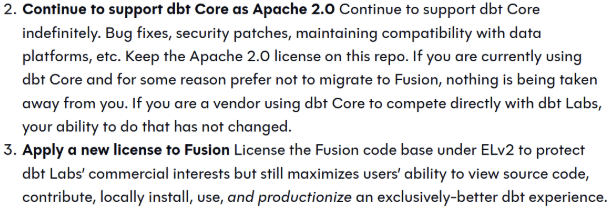Is dbt Core dead? We explain what ‘source available’ really means, why dbt Labs’ shifting to Fusion, and how it marks the end of dbt’s open source innovation.
On May 28, 2025, dbt Labs announced their new flagship product dbt Fusion, a complete rewrite of dbt Core in Rust. Unlike dbt Core, Fusion is under the Elastic License 2.0 (ELv2), making it free but not open source. Additionally, dbt released their proprietary VS Code extension which is free up to a limit of 15 users. Unclear, nuanced messaging has caused confusion about the future of dbt Core. The uncertainty is exacerbated by a lack of awareness about the subtle differences between “free” software and open source software.
While the shift may appear harmless, it has tremendous implications. Changes in licensing in any software ecosystem can have profound and far-reaching consequences for users, contributors, and the overall community. Given the economic circumstances, I believe this change warrants concern regarding dbt Core's longevity.
Source available vs open source
The ELv2 license is not approved by the OSI (the de facto standard for what constitutes open source). It discriminates against third parties providing software as a hosted or managed service. So although you can use dbt Fusion at your company for internal analytics, you cannot run it on behalf of other companies. Companies that provide a managed dbt experience will certainly be affected by this change.
ELv2 was created by Elastic in response to Amazon reselling a hosted version of Elastic Search. Given Amazon's resources and vast distribution channel, it was a serious threat to Elastic's business. In response to the license change, Amazon created OpenSearch, which is a fork of Elastic Search prior to the license change so that they could continue to develop it and sell it.
The license change had several major impacts. It resulted in a major fork of Elastic Search, creating a divergence between the two products. Additionally, Elastic Search took a major reputation hit because of the sudden change. Opinions were mixed because many long-time contributors to the open source felt like the foundation that they built in the open was being taken away from them. Others felt like Elastic Search was justified due to the existential threat.
The impact of the change will similarly be felt in the dbt partner ecosystem. When a product is open source, partners have confidence building solutions, because they are not solely at the mercy of the license holder. Open source provides the ability for anybody to fork the project and continue development. This freedom is exactly what makes open source so successful. Ultimately, it's insurance that emboldens users, companies, and partners to invest time and resources without risks.
Even though ELv2 is free to use, it doesn't provide the freedom of a true open source project.
Examples of companies that may be directly affected by this change are Astronomer, DataCoves, Dagster, and Paradime. Additionally, many large organizations do not allow the use of non-OSS software.
dbt Labs incentives
dbt Labs decided to keep dbt Core OSS, but then created a new non-OSS project dbt Fusion. To my knowledge, dbt Labs currently has no serious competitors trying to resell their products.
According to Tristan's blog, he states that the license change was done in order to protect dbt Labs' commercial interests.

Don't get me wrong, there's nothing ethically wrong about dbt Labs' decision. It may even be in their best financial interest to do so. However, I want to analyze what led to this situation and what it might mean for the future of dbt Core.
dbt Labs raised a $222 million round at $4.2 billion valuation in February of 2022. As a VC-backed company, you're expected to have a certain revenue multiple or growth to justify the valuation. dbt announced that it surpassed $100 million revenue in February of 2025, meaning it has about a 40x multiple. Given the large multiple, there's a high expectation for revenue growth. For example, Informatica generated $1.64 billion in revenue in 2024 and was recently acquired by Salesforce for $8 billion. This is a multiple of approximately 5x, which is more typical when massive growth is not expected. Unless profitable, companies typically raise money every 2-4 years, and given the size of dbt’s workforce, it is about time for another funding round. This financial situation creates intrinsic pressure to increase revenue.
How can dbt Labs increase revenue? Although their product dbt Core is widely adopted, they're anecdotally having difficulty converting users from OSS to the paid offering - because their Cloud offering isn't compelling enough. In my opinion, their largest competitor is themselves.
What I believe this means is that dbt Labs' strategy is to put dbt Core in “maintenance mode” to focus on Fusion and their other proprietary offerings. The wording of the announcement was very carefully selected to be vague. In particular, when referring to dbt Core support, it was only highlighted that bug fixes, security patches, and compatibility would be ongoing.
According to their dbt Core roadmap they've separated out the dbt language from the runtime. There's a specific callout that Fusion and Core will inevitably diverge because Fusion has additional capabilities that cannot be added to Core. To me, it makes sense that this is the chance for dbt Labs to invest in more restrictive and profitable software while slowly deprecating what not only made them great but is also their biggest challenge to financial growth.
Ultimately, resources are finite, and companies must prioritize what makes sense for the business.
But it doesn’t have to be this way
Building a company around open source is extremely challenging, but possible. Companies like Confluent (Kafka), Databricks (Spark), and Red Hat (Linux) are able to successfully build businesses while maintaining OSS innovation. Their proprietary platforms create enough value to successfully incentivize users to switch over from the OSS to paid, which enables a sustainable OSS business model.
Confluent and Databricks create value by drastically simplifying operations with managed services and provide unified platforms for organizations. Redhat is unique in that it provides enterprise-level support, security, and stability.
What can you do
dbt Core has transformed the data industry, with tens of thousands of users depending on it to power their analytics workflows and drive business decisions. The tool has been so influential that it helped create an entirely new profession: the Analytics Engineer, which is now standard across data teams.
Given dbt Core's foundational importance to modern data infrastructure, Analytics Engineers deserve a free, open, and continually evolving transformation platform. Otherwise, their careers will be dangerously dependent on the decisions of a single company. To safeguard the continuing innovation and development of the transformation space, it may be time to start a discussion about an open standard for defining data transformations.
We'd love to hear your thoughts about building a truly open source data stack. Join us on Slack.




.png)





